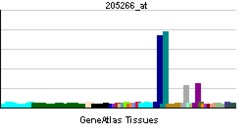白血病抑制因子
外观
此條目需要擴充。 (2014年3月19日) |
白血病抑制因子(Leukemia inhibitory factor,缩写 LIF)是一種屬於白介素-6大類的細胞因子。它能通過抑制分化影響細胞生长。LIF水平下降會使細胞開始分化。
功能
[编辑]白血病抑制因子能夠誘導骨髓性白血病細胞的末端分化,進而阻止其生長,因而得名。白血病抑制因子還有以下功能:能促進多種細胞的生長與分化,影響骨代謝、惡病質體、神經發育,胚胎發育以及炎症作用。受p53調控的白血病抑制因子能促進小鼠和人的胚胎着床[1]。一篇文章提出重組人白血病抑制因子可能可以提高意外懷孕的婦女(體內胚胎)的着床成功率[2]。
表達
[编辑]LIF在正常情況下會由囊胚中的滋養層(TE)表達,而其受體LIFR則會由內細胞群(ICM)的細胞表達。胚胎幹細胞取自內細胞群的細胞,在體外培養時就需要額外補充LIF。目前,重組LIF已可以通過基因工程的手段由植物(水稻)產生[3]。
幹細胞培養
[编辑]幹細胞培養基中大都含有LIF,可用於替代餵養層(feeder layer)細胞,因爲餵養層細胞的主要作用即產生LIF。不表達LIF基因的餵養層細胞難以支持幹細胞的培養[4]。LIF通過招募信號誘導分子以及轉錄激活因子3(STAT3)促進細胞的自我更新。活化的LIFR能徵募Stat3。隨後,JAK激酶能將其磷酸化。不過LIF和Stat3是不足以阻止細胞分化的,一旦移去培養基中的血清,幹細胞就會分化。在原生多能性幹細胞分化的可逆階段,加入LIF可以使細胞重回原生多能性階段[5][6][7]。
參考
[编辑]- ^ Wenwei Hu, Zhaohui Feng, Angelika K. Teresky1, Arnold J. Levine. p53 regulates maternal reproduction through LIF. Nature. November 29, 2007, 450 (7170): 721–724 [2017-01-27]. PMID 18046411. doi:10.1038/nature05993. (原始内容存档于2017-03-15).
- ^ Aghajanova, L. Leukemia inhibitory factor and human embryo implantation. Annals of the New York Academy of Sciences. 2004, 1034: 176–83. PMID 15731310. doi:10.1196/annals.1335.020.
- ^ Bradford A. Youngblood; et al. Application of recombinant human leukemia inhibitory factor (LIF) produced in rice (Oryza sativa L.) for maintenance of mouse embryonic stem cells. Journal of Biotechnology Volume 172. 2014-02-20: 67–72.
- ^ Stewart, C. L.; Kaspar, P; Brunet, L. J.; Bhatt, H; Gadi, I; Köntgen, F; Abbondanzo, S. J. Blastocyst implantation depends on maternal expression of leukaemia inhibitory factor. Nature. 1992, 359 (6390): 76–9. PMID 1522892. doi:10.1038/359076a0.
- ^ Martello, Graziano; Smith, Austin. The Nature of Embryonic Stem Cells. Annual Review Cell Developmental Biology. 2014, 30: 647. doi:10.1146/annurev-cellbio-100913-013116.
- ^ Kawahara Y, Manabe T, Matsumoto M, Kajiume T, Matsumoto M, Yuge L. Zwaka, Thomas , 编. LIF-Free Embryonic Stem Cell Culture in Simulated Microgravity. PLoS ONE. 2009, 4 (7): e6343 [2017-01-27]. PMC 2710515
 . PMID 19626124. doi:10.1371/journal.pone.0006343. (原始内容存档于2014-02-22).
. PMID 19626124. doi:10.1371/journal.pone.0006343. (原始内容存档于2014-02-22).
- ^ CGS : PTO Finds Stem Cell Patent Anticipated, Obvious in Light of 'Significant Guideposts'. (原始内容存档于2011-10-04).
拓展閱讀
[编辑]- Patterson PH. Leukemia inhibitory factor, a cytokine at the interface between neurobiology and immunology. Proc. Natl. Acad. Sci. U.S.A. 1994, 91 (17): 7833–5. PMC 44497
 . PMID 8058719. doi:10.1073/pnas.91.17.7833.
. PMID 8058719. doi:10.1073/pnas.91.17.7833. - Aghajanova L. Leukemia inhibitory factor and human embryo implantation. Ann. N. Y. Acad. Sci. 2005, 1034: 176–83. PMID 15731310. doi:10.1196/annals.1335.020.
- Králícková M, Síma P, Rokyta Z. Role of the leukemia-inhibitory factor gene mutations in infertile women: the embryo-endometrial cytokine cross talk during implantation--a delicate homeostatic equilibrium. Folia Microbiol. (Praha). 2005, 50 (3): 179–86. PMID 16295654. doi:10.1007/BF02931563.
- Stahl J, Gearing DP, Willson TA; et al. Structural organization of the genes for murine and human leukemia inhibitory factor. Evolutionary conservation of coding and non-coding regions. J. Biol. Chem. 1990, 265 (15): 8833–41. PMID 1692837.
- Bazan JF. Neuropoietic cytokines in the hematopoietic fold. Neuron. 1991, 7 (2): 197–208. PMID 1714745. doi:10.1016/0896-6273(91)90258-2.
- Lowe DG, Nunes W, Bombara M; et al. Genomic cloning and heterologous expression of human differentiation-stimulating factor. DNA. 1989, 8 (5): 351–9. PMID 2475312. doi:10.1089/dna.1.1989.8.351.
- Sutherland GR, Baker E, Hyland VJ; et al. The gene for human leukemia inhibitory factor (LIF) maps to 22q12. Leukemia. 1989, 3 (1): 9–13. PMID 2491897.
- Mori M, Yamaguchi K, Abe K. Purification of a lipoprotein lipase-inhibiting protein produced by a melanoma cell line associated with cancer cachexia. Biochem. Biophys. Res. Commun. 1989, 160 (3): 1085–92. PMID 2730639. doi:10.1016/S0006-291X(89)80114-7.
- Gough NM, Gearing DP, King JA; et al. Molecular cloning and expression of the human homologue of the murine gene encoding myeloid leukemia-inhibitory factor. Proc. Natl. Acad. Sci. U.S.A. 1988, 85 (8): 2623–7. PMC 280050
 . PMID 3128791. doi:10.1073/pnas.85.8.2623.
. PMID 3128791. doi:10.1073/pnas.85.8.2623. - Williams RL, Hilton DJ, Pease S; et al. Myeloid leukaemia inhibitory factor maintains the developmental potential of embryonic stem cells. Nature. 1989, 336 (6200): 684–7. PMID 3143916. doi:10.1038/336684a0.
- Moreau JF, Donaldson DD, Bennett F; et al. Leukaemia inhibitory factor is identical to the myeloid growth factor human interleukin for DA cells. Nature. 1989, 336 (6200): 690–2. PMID 3143918. doi:10.1038/336690a0.
- Yamaguchi M, Miki N, Ono M; et al. Inhibition of growth hormone-releasing factor production in mouse placenta by cytokines using gp130 as a signal transducer. Endocrinology. 1995, 136 (3): 1072–8. PMID 7867561. doi:10.1210/en.136.3.1072.
- Schmelzer CH, Harris RJ, Butler D; et al. Glycosylation pattern and disulfide assignments of recombinant human differentiation-stimulating factor. Arch. Biochem. Biophys. 1993, 302 (2): 484–9. PMID 8489250. doi:10.1006/abbi.1993.1243.
- Aikawa J, Ikeda-Naiki S, Ohgane J; et al. Molecular cloning of rat leukemia inhibitory factor receptor alpha-chain gene and its expression during pregnancy. Biochim. Biophys. Acta. 1997, 1353 (3): 266–76. PMID 9349722.
- Hinds MG, Maurer T, Zhang JG; et al. Solution structure of leukemia inhibitory factor. J. Biol. Chem. 1998, 273 (22): 13738–45. PMID 9593715. doi:10.1074/jbc.273.22.13738.
- Toward a complete human genome sequence. Genome Res. 1999, 8 (11): 1097–108. PMID 9847074. doi:10.1101/gr.8.11.1097 (不活跃 2016-12-27).
- Tanaka M, Hara T, Copeland NG; et al. Reconstitution of the functional mouse oncostatin M (OSM) receptor: molecular cloning of the mouse OSM receptor beta subunit. Blood. 1999, 93 (3): 804–15. PMID 9920829.
- Nakashima K, Yanagisawa M, Arakawa H; et al. Synergistic signaling in fetal brain by STAT3-Smad1 complex bridged by p300. Science. 1999, 284 (5413): 479–82. PMID 10205054. doi:10.1126/science.284.5413.479.
- Dunham I, Shimizu N, Roe BA; et al. The DNA sequence of human chromosome 22. Nature. 1999, 402 (6761): 489–95. PMID 10591208. doi:10.1038/990031.
參見
[编辑]外部链接
[编辑]- 醫學主題詞表(MeSH):Leukemia+Inhibitory+Factor
- Source of Recombiant Leukemia Inhibitory Factor (http://www.invitria.com/cell-culture-products-services/leukemia-inhibitory-factor-culture-media.html (页面存档备份,存于互联网档案馆) )


